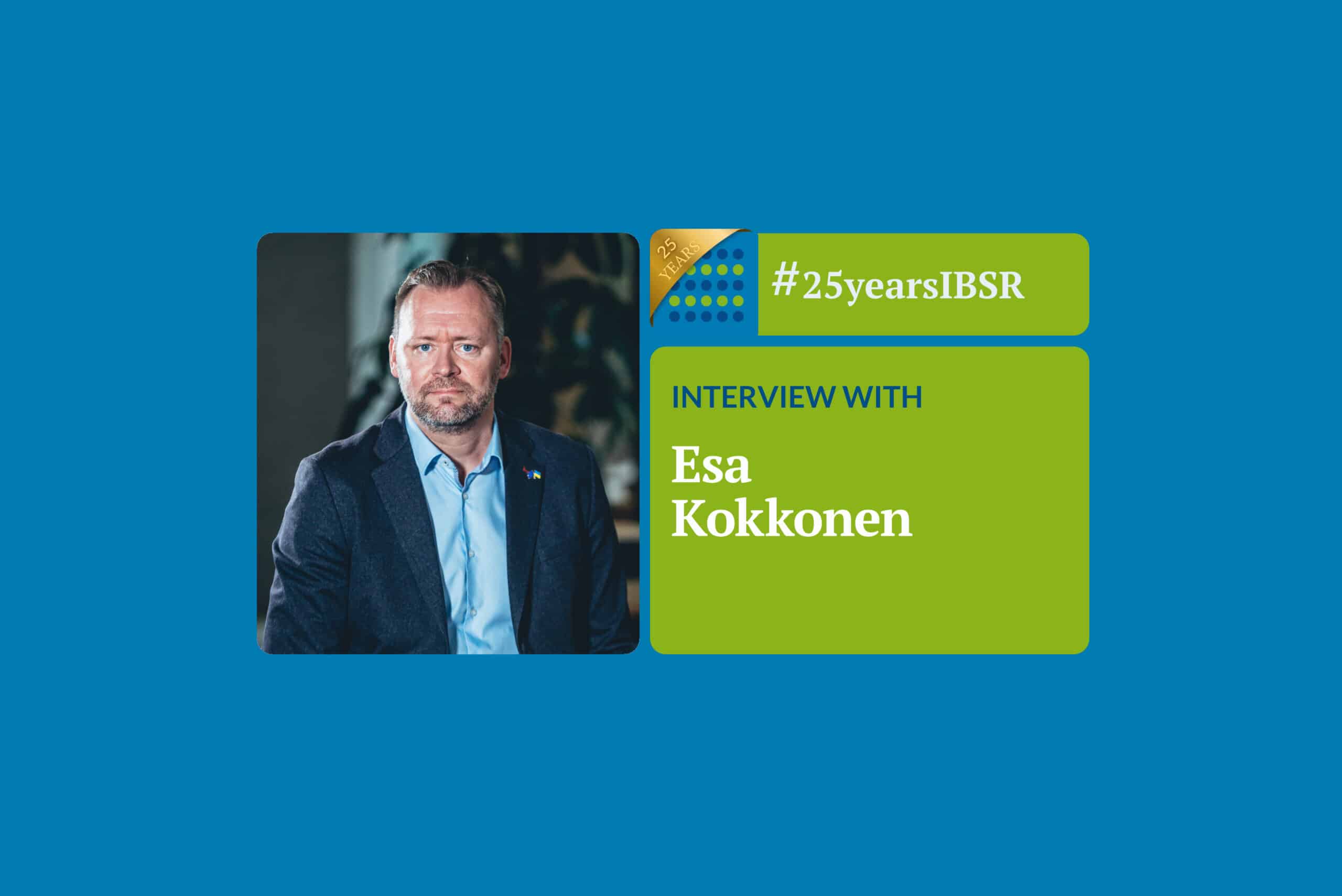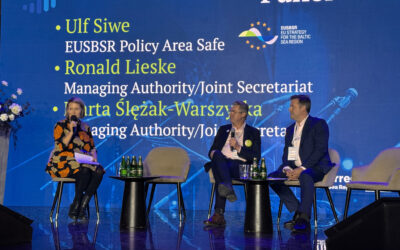
19 April 2023
Strategic partnership that works excellently
#25yearsIBSR
Esa Kokkonen, policy area coordinator Innovation of the EU Strategy for the Baltic Sea Region, reflects on the unique partnership between the Strategy and Interreg Baltic Sea Region, and explains Interreg for his home Tampere region in Finland.
Anna Gałyga: What’s your relation to the Programme?
I’ve been involved in the Baltic Sea region cooperation for more than 20 years already. Working for the Baltic Institute of Finland, I’ve been connected to the Programme in two ways. First of all, based on our role in the Tampere city and region, we help implement various Interreg Baltic Sea Region projects. Second of all, we are the main coordinator of policy area Innovation of the EU Strategy for the Baltic Sea Region. In both of these relations, there’s a lot of impact, benefits and learning that we have gained from the Programme so far.
Can you tell us more about those benefits?
The Programme is a very important instrument for local and regional actors in Tampere to connect with peers in neighbouring countries in topics like smart specialisation. We were able to coordinate and use the existing policies, policy instruments and innovation assets more effectively. The Programme helped us to be more effective with our innovation investments in the region. The Programme was in fact a learning platform for young EU Member States like Finland who share challenges and a lot of cultural, historical economical connections with other countries in the region.
The Programme has also been very important for the EU Strategy for the Baltic Sea Region: a lot of that experience was created and accumulated through Interreg collaboration. The Programme helps manage the coordination of the Strategy, too.
We believe that the strategic partnership between Interreg Baltic Sea Region and EU Strategy for the Baltic Sea Region works excellently. And on behalf of the EU Strategy and all its stakeholders, I would like to say that we’ve been very fortunate to have this well-established Programme, with very experienced staff, amazing record of results that we can build on. All this made it possible for us to develop a very ambitious agenda for the macro-region.
In what specific way did the Programme help you push the macro-regional agenda forward?
Our macro-region has a strong tradition in collaboration, in which the Programme played a special role. The majority of activities and projects supported by the EUSBSR were funded by Interreg Baltic Sea Region. In this way, the Programme kept providing a wide input that we analysed and connected to a wider EU policy landscape.
Most of innovation cooperation in the region today is about green and digital transition. There’s a variety of interesting topics in there, for example, blue economy, smart specialisation or digitalisation. Through Interreg funded projects, we managed to build strong macro-regional clusters and gain new opportunities in wider EU policies and networks.
For example, our policy area coordinators in Estonia had a leading role in the project DIGINNO. The project is part of real time economy that has been a priority to us since 2018. The Programme enabled us to implement concrete digital innovations and experiment with digital opportunities across borders so that we could be more competitive against Asian or American markets. Just recently, the Estonian Prime Minister promoted it at the European Commission. I am proud to say that in the Baltic Sea region, enabled by Interreg Baltic Sea Region financing, we started the next phase to scale that up in an EU wide context.
Are there any particular benefits for the region of Tampere that you would like to mention?
There have been several of those. In 2005, we started to reach out to Tampere’s peer regions along Via Baltica Nordica Development Zone and with a related cooperation proposal. It was our first own Interreg Baltic Sea Region project. It was about building a network and learning from peers. These were our first steps in smart specialisation when we tried to understand what our strengths and assets as a northern European region. And we have been continuing ever since.
Another important topic was air accessibility of our region to mainland Europe and beyond. We were happy to be part of the Interreg Baltic Sea Region project Baltic Bird. Together with similar non-metropolitan regions, we joined forces to develop ways to enhance our accessibility. This, for example, was a basis for negotiations with the airlines later on.
Recently, we have been focusing on green transition and social innovation a lot. And then there’s also sustainable smart city development as well as energy efficiency in an urban context with very successful projects for the city of Tampere.
What are your oldest and best memories related to the Programme?
My oldest memories go back to one of the Programme conferences at the beginning of this millennium. It was still early in my career as a Baltic Sea region cooperation professional. We hadn’t been involved in the Programme yet: everything sounded difficult and the competition seemed hard. But with experience gained in projects, taking next steps was always easier. In 2005, we started our first project as lead partner and, since then, we’ve been deeply involved in all programming periods.
We’ve advanced year after year and the Programme keeps raising the bar. I feel that the best memories are the latest ones related to the current Programme. Our collaboration as policy area coordinator Innovation with project developers has been very inspiring. It is so exciting to see what can be done with the Programme today and how much experience and knowledge is there among the stakeholders.
What associations does the word ‘Interreg’ evoke?
To me, Interreg is closely related to the Baltic Sea region even though there are Interreg programmes in other regions, too. Interreg is also about project work. As I represent an organisation that focuses on project development and management, Interreg reminds me that the deadline is coming: either for an application, reporting or some other internal task in the project… Finally, it is all about people, connections and new networks. Interreg multilevel collaboration is at the core of this Programme; it engages different members of the society: NGOs, local and regional authorities, educational and business organisations.
Through those connections, I got to know amazing people from around the region and learn from them a lot.
Do you have any wishes for the Programme for the future?
We’ve been harshly reminded that big changes or crises can happen. So, my main message for the Programme is: facilitate change and help the region be stronger together. And I am so happy about the current Programme agenda. Although it was it was prepared before the COVID crisis, it does enable us to tackle current challenges and build resilience for the future.
#25yearsIBSR
This year, our Interreg Baltic Sea Region Programme is celebrating its 25th anniversary. For more examples of #MadeWithIBSR project results and testimonials of great people who have helped shape the regions with us, visit our birthday celebrations page!
More recent news
D 3.4 Durability plan and transfer report for integration into existing infrastructures
Designing Interreg Baltic Sea Region that belongs to everyone
10 December 2025 Designing Interreg Baltic Sea Region that belongs to everyone Written by Eeva Rantama What if the next Interreg Baltic Sea Region...
Monitoring the Programme’s progress: transnational cooperation in the making
Representatives from nine Programme area countries gathered in Berlin on 19-20 November 2025 to review the progress of the Programme’s implementation and start preparing for the post-2027 period.
Beyond Borders: Turning Interreg Results into Policy Action
At this year’s EUSBSR Annual Forum in Sopot, the session “Beyond Borders: Interreg Results in Action for a Resilient and Safe Baltic Sea Region” showcased how Interreg Baltic Sea Region projects are transforming challenges into policy-relevant results that strengthen resilience, safety, and cooperation across the region. The session brought together project partners, EUSBSR policy area coordinators, members of the Programme Monitoring Committee and young participants to explore what it takes to turn project outcomes into lasting policy impact.





